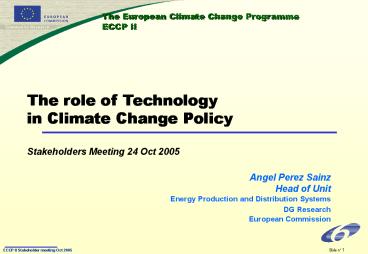The European Climate Change Programme ECCP II - PowerPoint PPT Presentation
1 / 15
Title:
The European Climate Change Programme ECCP II
Description:
Some issues and facts. The Energy system is complex ... New nuclear / Most RES (PV, solar, biomass, ocean ...) Microgrids. Some fuel cells ... – PowerPoint PPT presentation
Number of Views:32
Avg rating:3.0/5.0
Title: The European Climate Change Programme ECCP II
1
The European Climate Change ProgrammeECCP II
The role of Technology in Climate Change
Policy Stakeholders Meeting 24 Oct 2005
Angel Perez Sainz Head of Unit Energy Production
and Distribution Systems DG Research European
Commission
2
OUTLINE
- Where are we ? Where do we want to go ?
- A huge potential for technology
- Actions underway Is there sufficient awareness,
consistency ? - Avenues for the future The role of ECCP
3
CLIMATE CHANGE - POST 2012
- Communication from the EC
(February 2005) Winning the
Battle Against Global Climate Change - Challenges More drastic GHG
reductions will be needed - max. 2C increase, max. 450
ppmv,- 50 / 60 by 2050 - Participation Challenge Include all major
emitters - share of EU-25 in world GHG emissions will
decline to lt10 - share of developing countries will expand to gt50
- Innovation Challenge
- Pulling technological change Stimulate markets
to promote adoption of new technology - Pushing technological change Invest in knowledge
economy to give EU a competitive edge in a low
carbon future - Adaptation Challenge
4
CLIMATE CHANGE - POST 2012
- Communication from the EC (February
2005) - Winning the Battle Against Global Climate Change
- Conclusions
- The inclusion of more policy areas
- widen scope of international action to cover all
greenhouse gases and all sectors. - Enhanced innovation to transform energy and
transport systems - optimal mix of technology push (RTD) and pull
(Market Stimulation) instruments - The continued use of market based and flexible
instruments - The inclusion of adaptation policies
- More resources need to be allocated in the EU to
adapt effectively to climate change - The broadening of participation
- Specific projects/ programmes with major emitting
nations to improve energy efficiency or to
promote development and adoption of low-carbon
technologies
5
CLIMATE CHANGE - POST 2012
- Communication from the EC (February 2005)
Winning the Battle Against Global Climate
Change - EC recommendations for a post-2012 EU Climate
Change Strategy NEXT STEPS - Immediate and effective implementation of agreed
policies - Kyoto Protocol, ETAP, Energy Efficiency
Initiative. - Increased public awareness
- More and better focused research
- increased EU funding under the 7th Framework
Programme - Stronger co-operation with third countries
- technology transfer, scientific RD cooperation
- European Climate Change Programme in 2005
- energy efficiency,
- RES,
- the transport sector
6
Some issues and facts
- The Energy system is complex
- Debate by policy drivers, climate change, but
also security of supply, growth and
competitiveness - Greenhouse gases and the energy system
- Sectoral approaches useful, but need to address
the whole energy system - Interaction between sources, carriers, and
conversion must also be reflected in RTD
programmes - Energy efficiency and energy savings Energy
policy and Technology policy
7
Development vs. Deployment
8
Technology Development vs. Deployment
- Factors to consider
- Technology push vs. Market pull
- Competition factors level playing field
- Internalisation of external costs
- High cost, long life of energy infrastructures
9
Introduction to the WedgesRef. R.
Socolow-Princeton University
The Stabilization Triangle
Billions of tons of carbon per year
14
Projected emissions
Stabilization triangle
Interim goal
7
Flat path
Historical emissions
Tougher targets
1.9
year
0
1955
2005
2055
10
Wedges
Cutting the Stabilization Triangle in Wedges
One wedge is 750/2 175 GtC
7 1 GtC
Projected emissions
Flat path
50 years
11
A huge potential for technology( but obstacles
are also huge)
Energy technology developed in the Framework
programmes is all climate friendly
12
A great variety of initiatives underway
- Both at the European and International level
- RTD Framework programmes and Competitiveness and
Innovation Programme (CIP) - The United Nations Development Programme Energy
for sustainable development - A number of initiatives for facilitating
financing and investment in low carbon
technologies
13
A great variety of initiatives underway
- Need for awareness and coordination
- Need for a more coherent strategy on technology
policy for climate change
14
Winning the battle Next steps
- Recognise the role of technology
- Identify the interactions between policy
measures, particularly those where technology has
a central role - A Climate change Technology Strategy and Policy
15
Role of ECCP
- Establish a working group (including public and
private stakeholders) to - Discuss and clarify issues and
- Review and analyse initiatives underway
- Assess strategies in relevant major partners
- Recommend a way forward to the EC/EU































